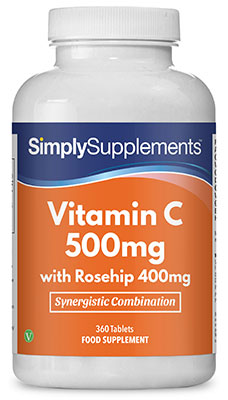Health Benefits of Vitamin C

Vitamin C is a well-loved vitamin and the one many of us reach for when we feel a cold coming on. The incredible way in which vitamin C benefits health is in large part due to its potent antioxidant content; helping to defend against colds and flu, and protecting collagen in the joints and skin. Here we look at the many ways this essential vitamin can promote good health and wellbeing.
What is Vitamin C?
The health benefits of vitamin C were first noticed back in the 16th century when sailors used lemon juice to effectively prevent scurvy, a disease which commonly affected sailors due to their restricted diet. However, they didn’t realise that it was the rich vitamin C content in lemon juice that helped to prevent the disease.
Vitamin C itself, also known as ascorbic acid, was only identified in 1932 by the Hungarian research team of Joseph L Svirbely and Albert Szent-Györgyi, who was later awarded the Nobel Prize in Medicine for their discovery. Since then, several advancements have been made and vitamin C has become one of the most popular supplements around the world.
The vitamin is best known as a powerful antioxidant. These are the body’s first line of defence against the damage caused by the oxidation process and its by-products, known as free radicals. Because oxidation occurs when eating, moving and breathing it is an unavoidable part of everyday life. However, poor diets and lifestyle habits are known to significantly worsen its effects. While vitamin C isn’t naturally produced by the body, it works as an antioxidant to destroy free radicals before they cause any harm and so reduces the risk of premature ageing and disease.
Vitamin C Benefits
- Colds and flu: Studies involving people under physical stress or in extreme conditions (including marathon runners and explorers) found that high doses of vitamin C reduced the frequency and duration of developing colds by 50%. However, other studies have found no significant benefits.
- Iron absorption: Taking vitamin C alongside iron can help to improve the body’s absorption of iron because vitamin C helps to transform iron into a form which is easier for the intestines to absorb.
- Blood pressure and cardiac health: There is evidence to show that vitamin C can help to reduce the build-up of fatty plaques along artery walls and so prevent the progression of vascular stiffness and atherosclerosis.
- Skin appearance: Vitamin C helps to maintain collagen in the skin and has shown benefits in reducing the damage caused by UV rays from the sun. The vitamin is often used in topical or supplement form to prevent skin damage, ageing and pigmentation.
- Joint function: Vitamin C is the most important vitamin for the renewal of collagen in joint cartilage and protects it against damage from ‘wear and tear’. As a result, it promotes flexible and supple joints and may offer some protection against the onset of age-related joint conditions such as osteoarthritis.
- Exercise: Vitamin C appears to improve oxygen intake during exercise and physical performance, particularly in older adults. The skeletal muscle stores large amounts of vitamin C, and when oxygen intake is improved it helps to delay onset muscle soreness after exercise.
- Beneficial for smokers: Chemicals in cigarette smoke damage DNA cells, trigger inflammation and increase free radical damage. There is some evidence to suggest that vitamin C may help to reduce inflammation and minimise the impact of these damaging toxins. One study found significant improvements to endothelial function in smokers with a daily intake of 2000mg after 12 weeks.
- Asthma: Histamine contributes to inflammation in the lungs and worsens asthma symptoms. Vitamin C is a natural antihistamine and so may offer some relief from asthma symptoms by blocking histamine and reducing the inflammation it causes.
- Vision: There are many benefits of vitamin C when it comes to vision. Inflammation in capillaries around the eyes is a common cause vision loss, particularly age-related macular degeneration (AMD). Vitamin C’s antioxidant activity may help to reduce this inflammation and improve blood supply to the eyes. Studies have also shown that people with cataracts often have low dietary levels of vitamin C.
Sources of Vitamin C
The human body cannot produce vitamin C so it needs to be consumed through the diet and the most effective way is to eat a balanced diet rich in antioxidant fruits and vegetables. Good food sources of vitamin C include:
- Citrus fruits such as oranges and grapefruits
- Green and red peppers
- Strawberries
- Broccoli and Brussels sprouts
- Berries, particularly cranberries and blueberries.
Try to eat fruits and vegetables fresh as cooking and storing can reduce their vitamin C content by as much as 40%. In fact, the vitamin C content starts to decline as soon as they are picked.
Vitamin C Deficiency
A severe vitamin C deficiency causes a condition called scurvy, which is now rare in the UK. It is often found in malnourished individuals and treatment requires medical supervision. However, a less severe vitamin C deficiency or insufficiency may present the following symptoms:
- Lethargy
- Aches and pains
- Skin bruises easily
- Dry skin and splitting hair
- Swollen or bleeding gums
- Frequent nosebleeds
- Poor wound healing.
Certain lifestyle factors increase your risk of vitamin C deficiency. Smoking speeds up the oxidation process and the increases the production of free radicals, so smokers are often advised to consume an extra 35mg of vitamin C per day.
People following fad diets may also have low vitamin and mineral levels due to restrictive diets, while digestive conditions such as Crohn’s disease and ulcerative colitis can reduce the body’s ability to absorb sufficient levels of vitamin C.
How Much Do I Need?
Vitamin C is water-soluble, which means that it is quickly used or lost from the body. The current daily recommended daily allowance (RDA) is 40mg per day. However, this has been widely criticised as inadequate because, while it suffices to prevent vitamin C deficiency, it is considerably less than the optimum intake. Proposals have been made to rename 40mg as the minimum daily allowance and it is thought that the optimum intake lies somewhere between 250mg and 2000mg per day, but further research is ongoing.
Vitamin C is likely safe for women who are pregnant or lactating at strengths below 2000mg per day. However, if you have high blood pressure during pregnancy use vitamin C cautiously under the supervision of your GP.
Aspirin and nonsteroidal anti-inflammatory drugs (NSAIDs) often increase the amount of vitamin C lost through urine and so lower the amount of vitamin C in the body. For people taking aspirin or NSAID’s for prolonged periods of time, higher dietary intakes of vitamin C can be beneficial.
The ageing process can also reduce the digestive systems ability to break down and absorb vitamins from food as efficiently as it once did so higher intakes may be needed for adults over 65. There is also a suggestion that the intake for men should be 20% higher than women due to higher lean body masses.
Mega Dose Vitamin C for Cancer
While this is still an extremely controversial theory, there is preliminary evidence that vitamin C may start to work slightly differently when administered at mega-high doses. At strengths around 10g a day, it triggers the production of hydrogen peroxide within cancer cells, which appears to kill off the cells. It also seems that the body’s natural tolerance level for vitamin C drastically increases when cancer cells are present in the body. Intravenous vitamin C therapy is a simple procedure and is backed by several well-known doctors. However, it is costly and more extensive research is required before this treatment can be recommended.
Can I Take Too Much Vitamin C?
Vitamin C is generally safe for most people when taken within the recommended guidelines, with an upper level of 2000mg per day advised for vitamin C supplements. If you take too much vitamin C, the body will just excrete it through urine. For some, high doses may cause diarrhoea or flatulence, but these symptoms should disappear as soon as you stop or reduce your intake. While it may be necessary to take mega high doses to treat certain ailments, this should only be done under medical supervision.
Are There Any Interactions?
There are no known interactions with other supplements or medications but if you are taking any prescription medications you should consult your GP prior to taking vitamin C in supplement form. If you have low copper levels you should use vitamin C supplements with caution as high doses may further decrease copper levels if levels are already low.

 Nicole
Nicole 

























